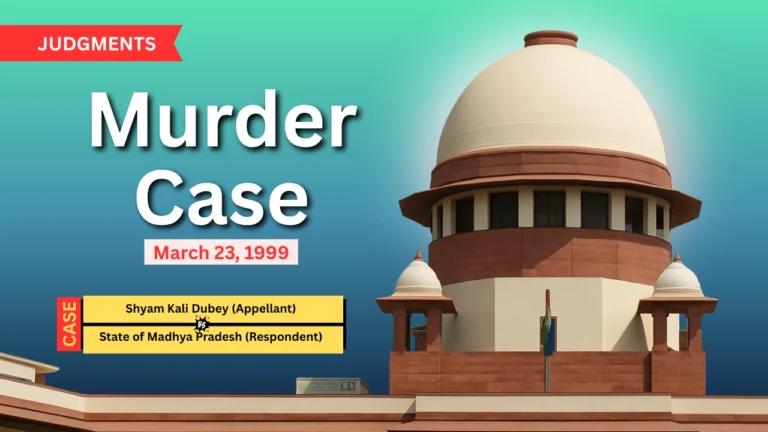The Supreme Court of India recently acquitted Shyam Kali Dubey, who was previously convicted under Section 302 of the Indian Penal Code for murder. She and her husband were accused of beating a man to death with sticks near a temple, allegedly after a land dispute turned violent. However, the Supreme Court, after examining the evidence in detail, ruled in her favour and set aside the earlier conviction.
Background of the Case
The incident occurred on the evening of March 23, 1999, when the deceased objected to the appellant grazing cattle in his field. An altercation followed, during which she allegedly hit the deceased with a stick. Her son and mother-in-law then took her away, but she reportedly warned the deceased she would return with her husband.
Read also:- Supreme Court Hears High Court Judge's Plea Against In-House Procedure for Removal
Later that night, both were accused of assaulting the deceased, resulting in his death.
- PW-6 (Doctor) stated there were 13 injuries on the deceased’s body.
- Cause of death: Head injury and asphyxia due to regurgitated blood in the airway.
- Time of death estimated between 10 PM to 12 midnight, which contradicted witness claims that the death occurred around 7 PM.
Key Witnesses and Contradictions
- PW-7 (Father of the deceased) claimed he saw the attack and heard his son shouting the names of the attackers.
- Other eyewitnesses (PW-1, PW-2, PW-4) only saw the accused fleeing and did not hear any names shouted.
- Police found the deceased's body in his home’s courtyard, not at the temple.
- FIR was lodged at 9 PM, yet death was stated to have occurred later — a serious timing mismatch.
Read also:- 13 Judges Challenge SC's Administrative Authority Over High Courts
“The death took place sometime between 10 to 12 O’clock while the incident is said to have occurred at 7 O’clock and the victim having died 10 minutes after being brought to the house.” – Supreme Court
- The court questioned why the injured victim was taken home instead of the hospital.
- No chemical analysis was done on the blood-stained stick recovered from the appellant.
- The weapon wasn’t verified by the doctor to match the injuries.
Suspicious Injuries on the Deceased’s Parents
- Both parents had incised wounds caused by sharp weapons like a knife or axe.
- The doctor stated these injuries could be self-inflicted.
- The father admitted during cross-examination that the deceased had threatened his family and there were property disputes within the household.
Read also:- Power Supply Disruption in Supreme Court’s Lawyers Chambers on August 9: Official Notice Issued
“The defence had in fact, spoken of a rift between the family of the deceased and the deceased.” – Supreme Court
Verdict and Final Observations
The Court found multiple gaps and contradictions in the prosecution’s case:
- No clarity on location of death.
- Time of death not supported by medical evidence.
- Eyewitness statements were either inconsistent or improbable.
- Injuries on the deceased’s parents went unexplained.
“There is also no clarity as to the time when the death was occasioned, so as to garner support from the medical evidence.” – Supreme Court
Due to these doubts, the Court acquitted Shyam Kali Dubey and stated she should be released immediately if not wanted in any other case.
The appeal was allowed, the conviction set aside, and Shyam Kali Dubey was acquitted.
Case: Criminal Appeal No. 305 of 2011
Parties: Shyam Kali Dubey (Appellant) vs. State of Madhya Pradesh (Respondent)
Date of Judgment: 8 August 2025














